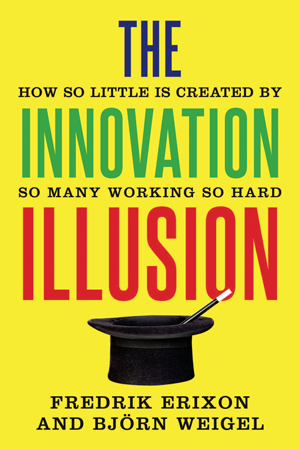MIT Sloan Management Review, November 23, 2016
by Theodore Kinni
 Artificial intelligence, robotics, blockchains, reusable rockets, self-driving cars, genetic engineering — there is an unprecedented explosion of innovation going on all around us, and nowhere is it creating more froth than in the corporate sphere. And yet, as Fredrik Erixon and Björn Weigel point out in their new book, The Innovation Illusion: How So Little Is Created by So Many Working So Hard (Yale University Press, 2016), GDP growth, productivity, and corporate investment in the capitalist economies of the West are all on the decline.
Artificial intelligence, robotics, blockchains, reusable rockets, self-driving cars, genetic engineering — there is an unprecedented explosion of innovation going on all around us, and nowhere is it creating more froth than in the corporate sphere. And yet, as Fredrik Erixon and Björn Weigel point out in their new book, The Innovation Illusion: How So Little Is Created by So Many Working So Hard (Yale University Press, 2016), GDP growth, productivity, and corporate investment in the capitalist economies of the West are all on the decline.Erixon and Weigel, both of the European Centre for International Political Economy, an economic think tank, peg this counterintuitive reality to “gray capitalism, excessive corporate managerialism, second-generation globalization, and complex regulations.” They contend that these “Four Horsemen of capitalist decline” have rendered large companies moribund and risk-averse, and thus have produced an environment in which innovation flourishes, but never generates a full measure of economic output.
In the following excerpt, the authors remind us that while innovations may produce unicorns that enrich founders and VCs, they can’t drive broad-based economic progress on their own. Read the excerpt here.















No comments:
Post a Comment